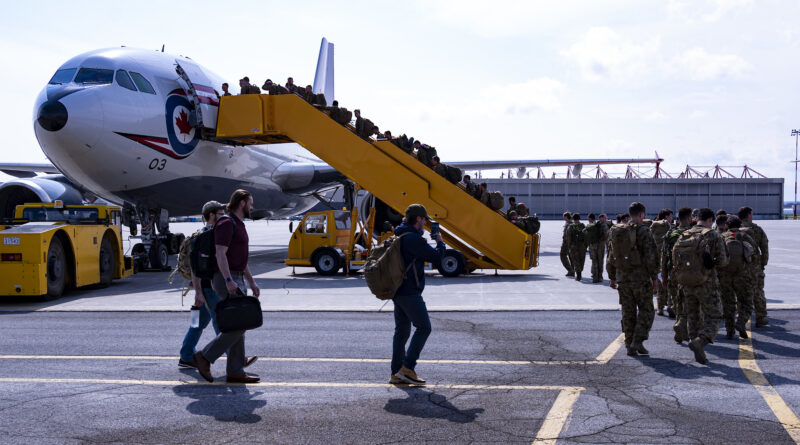Sudan Evacuation Shows Way Forward for Humanitarian Intervention
by Jay Heisler
When the Sudan evacuation seized international headlines, with US, Canadian and European militaries deploying into the conflict to rescue their citizens, there was little reflection on what this means for the future of humanitarian intervention. As I have previously reported for Voice of America, the future of UN peacekeeping is widely seen as now no longer what it used to be, both for Canada and for allies in Europe – several of whom have, like Canada, scaled down their peacekeeping commitments. Instead, the future might be humanitarian interventions done through civil society organizations that are veteran-run but still operating in cooperation with the US and Canadian governments. Such organizations did deploy to Sudan, after deploying to Ukraine and previously to assist with the evacuation of Afghanistan.
John Sullivan is retired from the LA County Sheriff’s Department. John has published about UN peacekeeping deployments for US police, and told me in an interview that such deployments are exceedingly difficult for US police to get as there is no centralized program for them in the US relationship with the UN. Instead most international deployments for US police come from partnerships with police departments and other organizations abroad outside the context of UN peacekeeping missions.
John has published calling for a humanitarian surge in Ukraine, utilizing the kind of civil society assets that the US and Canada excel at.
“The issue of non-combatant evacuation operations (NEOs) is tangential to peacekeeping,” John told me. “That is, NEOs are separate from but can interact with peacekeeping and peace enforcement operations. They both face similar tactical and political dimensions and require similar skills and information operations, civil affairs, and intelligence operations. They both can also benefit from military police and gendarmerie-type forces.”
“Peacekeeping, humanitarian, operations, and NEOs are specific mission types that are necessary at many phases of conflict,” John added. “That is, they are operations that support an overall strategic or operational priority. The humanitarian surge I describe for Ukraine would not replace peacekeeping or other efforts. It would augment these efforts. Depending upon the timing of the surge, it could prepare the operational area to deter an adversary or mitigate the effects of combat by supporting combat and humanitarian operations. This would not replace or supplant peacekeeping but augment peacekeeping.”
I have been personally involved in just such an effort, having served as media lead on Operation North Star (a sister organization to Task Force Pineapple), then at the Ukraine NGO Coordination Network (UNCN), then later a bit on the Sudan evacuation.
Alla Prokhovnik-Raphique is Chief Liaison and Management Officer at UNCN. From her work on UNCN, she was named by City & State Magazine as one of the 50 women of 2023 who are improving New York.
“One of the biggest factors that contributed to the creation of Ukraine NGO Coordination Network is that the core founding members had already established working relationships during their evacuation and aid to Afghanistan,” Alla told me. “Having those established connections and networks facilitated transferring them to Ukraine and quickly on-boarding and training new members in order to respond almost immediately following the invasion.”
“Similarly, when the earthquake occurred in Turkey and Syria and subsequently the humanitarian crisis in Sudan, our organizations were able to utilize already established connections to quickly mobilize and deliver aid where it was most needed,” Alla added. “There are so many incredible, grassroots NGOs out there, bringing them together is certainly a process. It is important to maintain the connections and community among members, reminding them of joint goals.”
Most (in fact, nearly all) of UNCN’s partner charities are veteran owned and operated, and include both US and Canadian personnel. However, one does not need to be a veteran to get involved.
“What has surprised and inspired me about the response to the Ukraine war is that in addition to the trained and seasoned professionals there are a lot of regular people completing small tasks and working in tandem to move mountains,” Alla said.
“While there are numerous brave individuals doing the essential work on the ground, a lot of coordination and logistic efforts are happening remotely by volunteers, many of whom have other day jobs and obligations.”
My own volunteering on this cause was done simultaneously with being the Canada correspondent for Voice of America and teaching part time at a local art college.
What then about traditional humanitarian missions? I spoke with someone in the Irish military with extensive experience in UN Peacekeeping missions.
“Leave it at… spoke to a serving Irish officer,” he instructed to me, requesting anonymity.
Ireland has branded itself as a peacekeeping-majority military. How is that working out?
“You have to look at military culture in Ireland,” he told me. “Ireland is because of its neutral status, size of the defense forces, there isn’t a martial culture like there would be in the UK. We’re probably the smallest government department and we’re the smallest spenders on defense in the EU.”
Is there a robust civil society led by veterans like in the US and Canada?
“We have veterans organizations and they do charitable work,” he told me. “You never get thanked for your service in Ireland. You tell someone in Ireland you’re a member of the defense forces, they don’t know what to say to you.”
However, he notes that this has paid off for Ireland in its international clout.
“Ireland has just finished at the end of 2022 two years as a non-permanent member of the Security Council. The military’s commitment to peacekeeping was a big part of [how Ireland got that seat on the Security Council].”
Jay Heisler is Voice of America’s Canada correspondent. He also teaches a mental health advocacy course at a Canadian university and works on various training and education projects in national security in the US and Canada. He is currently working on a book contract and at other freelance writing.

